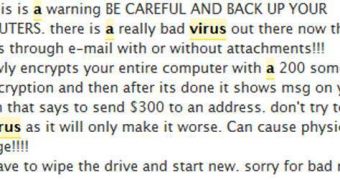Another bogus virus warning is currently doing the rounds. The message suggests that the “virus” in question might be the CryptoLocker ransomware, but the author also adds some misleading information.
“Hey this is a warning BE CAREFUL ANF BACK UP YOUR COMPUTER. There is a really bad virus out there now that infects though e-mail with or without attachments!!!” the warning reads.
“It slowly encrypts your entire computer with a 200 something bit encryption and then after its done its shows msg on your screen that says to send $300 to an address. Don't try to kill the virus as it will only make it worse. Can cause physical damage!!! you have to wipe drive and start new. sorry for bad news.”
CrytoLocker appears to partly fit the description. However, as Hoax Slayer highlights, the malware only encrypts certain files, not the entire computer. In fact, computers infected with this piece of ransomware continue to work, except for the fact that certain files can’t be accessed.
The threat doesn’t cause any physical damage to infected computers, and it doesn’t wipe hard drives.
Trend Micro researchers have been analyzing the threat and they’ve published an advisory on how users and organizations can defend themselves.
So far, no one has managed to decrypt the files encrypted by CryptoLocker, so users must be careful not to get their devices infected in the first place.
For users, the advice is the same as with all other threats. Don’t click on attachments or links contained in unsolicited emails, make sure your software is up to date, and ensure that your antivirus is always running in the background.
On the other hand, if you regularly back up your most important data, the damage caused by malware can be limited.
Organizations should review policies regarding email attachments, and limit privileges on devices used only for specific purposes.
So far, 64% of CryptoLocker victims are based in the United States, 11% are in the United Kingdom and 6% in Canada.

 14 DAY TRIAL //
14 DAY TRIAL //